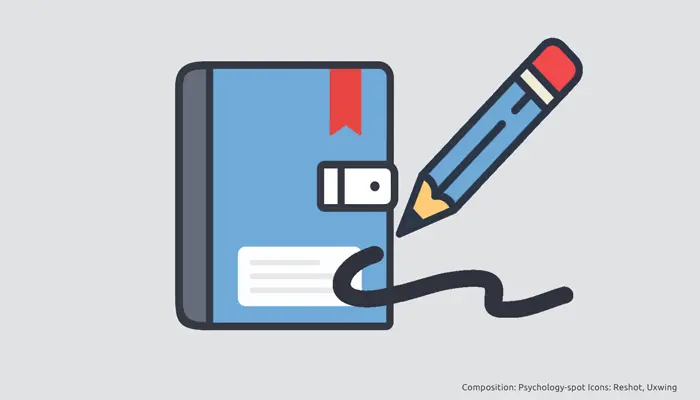
Keeping a Gratitude Journal can be very beneficial for our well-being. In fact, gratitude is one of the most positive feelings we can experience. In the most difficult moments, when everything seems to be going wrong and pessimism invades us, activating gratitude is an excellent antidote that helps us balance our emotions to better face adversity.
What is a Gratitude Journal?
The Gratitude Journal or gratitude diary is a psychological tool that helps us become aware of all those positive things that exist in our lives, those that we normally take for granted and to which we do not pay much attention. Its main objective is to develop the habit of giving thanks for who we are, what we have, what we have achieved or the people who accompany us.
The Gratitude Journal allows us to focus on those little details that bring us joy, happiness, pleasure, and satisfaction. Those little things that happen throughout the day and that we often overlook. Therefore, it allows us to develop a more optimistic vision and achieve greater well-being. Therefore, it is not surprising that it is used to address a wide range of psychological or even physical problems.
What benefits does a Gratitude Journal bring us?
• We feel happier
When we practice gratitude, we need to pause in the hectic pace of everyday life to capture those moments for which we feel grateful. Keeping a Gratitude Journal demands an even longer pause to write down those feelings and thoughts. As a result, we begin to release serotonin and dopamine, two neurotransmitters that are primarily responsible for happiness.
• Reduces stress and anxiety
The feeling of gratitude also helps regulate stress hormones, thus reducing anxiety. In fact, George Mason University psychologists found that Vietnam War veterans who experienced higher levels of gratitude also had fewer post-traumatic stress symptoms. Gratitude not only greatly reduces stress, but it also helps us to adopt a more positive attitude towards life.
• Relieves depression
Our brain is programmed to notice negative things more than positive ones. It is a mechanism that helps us stay safe, alerting us to dangers or possible setbacks. However, this bias also contributes to developing a more pessimistic view of life. Instead, keeping a gratitude journal allows us to balance the scales, establishing the habit of also looking at the positive things in life. Over time, gratitude becomes automated and it will be easier for us to have a more optimistic vision.
• Increases self-esteem
Research conducted at the National Taiwan Sports University found that athletes who practiced gratitude had stronger self-esteem. Why? Gratitude decreases our need to compare ourselves with others, so we feel more satisfied with what we have achieved, which reinforces our self-esteem. In addition, the positive feelings generated when we write about the things we are grateful for also improve our motivation and empower us.
• Protects health
The benefits of gratitude are not limited to the emotional plane, they also extend to our health. Research conducted at the University of Illinois, for example, found that people who tend to experience gratitude report less pain and feel healthier. It is not a coincidence. Researchers at the University of California found that gratitude reduces inflammation in patients and improves survival rates. Therefore, writing a Gratitude Journal can also improve our quality of life.
• It enhances sleep quality
Gratitude can even act as a sleeping pill. A study conducted at Grant MacEwan University found that people who kept a Gratitude Journal and spent 15 minutes before going to bed writing about things they were grateful for not only fell asleep faster, but also they rested better and had a more restful sleep. This is probably due to the fact that gratitude generates a state of peace and serenity that facilitates relaxation and drives away worries, preparing our mind to enter the world of dreams.
It should be noted that the benefits of the Gratitude Journal are not limited to adults. Several studies have found that children and adolescents who keep this type of therapeutic diary not only experience greater emotional well-being, but also feel more engaged in their activities, are more sociable, and ultimately end up having more success at school. Therefore, it is advisable that children acquire the habit to write three things each day for which they feel grateful.
How to keep a Gratitude Journal?
The first step is to choose a journal. There are a few details to consider: do you prefer to write a physical journal or record your thoughts digitally? Do you prefer some guidance and motivation or a completely blank notebook to let your imagination run wild?
In any case, consider that traditional paper journals offer more flexibility and help you disconnect from day-to-day life and technology, so they tend to favor introspection more than keeping a digital journal. Maybe a new journal is all you need to get inspired to start writing.
The basic idea is simple: you just have to write down daily – or at least once a week – all those things for which you feel grateful. You may find it a bit difficult at first, mainly due to that negativity bias, but you will soon discover that there are many things to be thankful for.
If you want to create the habit, it is important that you choose a time of day to write in your Gratitude Journal, either when you wake up or before going to bed. Before you start the journal, determine how many things you will write each day. Ideally, you should find at least 3 reasons to be thankful for, even if they are small details or seemingly inconsequential things.
What can you write in your Gratitude Journal?
1. Daily tasks that make you feel good. You can feel grateful for many everyday things that are usually taken for granted, from taking a warm and relaxing bath to listening to the music you love, seeing a beautiful flower on your way, enjoying the company of your partner, playing with your children or reading a good book. Nothing is too small or inconsequential that it doesn’t fit in your Gratitude Journal.
2. Your possessions count too. The Gratitude Journal can also include all those material possessions that make your life easier or give you a certain amount of pleasure or satisfaction. You can feel grateful, for example, for your incredible collection of books, that great sound system that gives you many hours of pleasure, or your beautiful garden.
3. Celebrate your qualities. In the Gratitude Journal you can also write those skills, abilities and aptitudes that make you feel proud and make you a special person. You can even include such basic skills as walking, listening, seeing or tasting as they are wonderful gifts that we should never take for granted and allow us to enjoy life and explore the world in 360 degrees.
4. Be thankful for the people who are part of your life. If you have people who love you and give you support when you need it most, you can include them in your Gratitude Journal as well. Recognizing their importance will not only allow you to value them much more, but it will also strengthen the bond. Therefore, gratitude will help you activate a virtuous circle.
5. Remember what has made you happy. The day you do something special, don’t forget to mention it in your Gratitude Journal. A meeting with friends, a relaxing day, a walk with your partner or simply a good day at work can be more than enough reasons to experience gratitude. Do not limit yourself to the experience, also delve into the emotions you felt.
6. Focus on what you have left. When we are exposed to adversity, it is natural for us to focus on the damage and what we have lost. However, counterfactual gratitude encourages us to think about what we still have. It’s about changing your perspective to focus on those things you have left after the tragedy and for which you can still be grateful. Think that it could always have been worse.
7. Focus on what you’ve earned. In the middle of the storm, it’s hard to see something positive, but when the storm subsides, start thinking about the good things that can come out of that situation. Most negative events usually have a positive counterpart, you just fail to notice it. When you discover it, write it down in your Gratitude Journal. You may even feel grateful for what at first glance seemed like obstacles and problems because, if used properly, they can help you get out of your comfort zone to achieve great things.
Finally, if you want to get the most out of the Gratitude Journal, don’t just make a list, dig into the reasons you’re grateful for. Reflect on what these people, experiences, qualities, or possessions bring to your life.
It is also convenient that once a month or, if you prefer, once a year, you reread everything you have written in your Gratitude Journal. You can also resort to those words in the darkest moments. It will help you feel better by reminding yourself those things that can improve your life. It will only take a few minutes and the benefits you’ll get will be enormous.
Sources:
Ducasse, D. et. Al. (2019) Gratitude diary for the management of suicidal inpatients: A randomized controlled trial. Depress Anxiety; 36(5): 400-411.
O’Connell, B. H. et. Al. (2017) Feeling Thanks and Saying Thanks: A Randomized Controlled Trial Examining If and How Socially Oriented Gratitude Journals Work. J Clin Psychol; 73(10): 1280-1300.
Diebel, T. et. Al. (2016) Establishing the effectiveness of a gratitude diary intervention on children’s sense of school belonging. Educational and Child Psychology; 33(2): 117-129.
Redwine, L. S. et. Al. (2016) Pilot Randomized Study of a Gratitude Journaling Intervention on Heart Rate Variability and Inflammatory Biomarkers in Patients With Stage B Heart Failure. Psychosom Med; 78(6): 667-676.
Hung, L. & Wu, C. (2014) Gratitude enhances Change in Athletes’ Self-Esteem: The Moderating Role of Trust in Coach. Journal of Applied Sport Psychology; 26(3): 349-362.
Hill, P. L. et. Al. (2013) Examining the Pathways between Gratitude and Self-Rated Physical Health across Adulthood. Personality and Individual Differences; 54(1): 92-96.
Digdon, N. & Koble, A. (2011) Effects of Constructive Worry, Imagery Distraction, and Gratitude Interventions on Sleep Quality: A Pilot Trial. Applied Psychology: Health and Well-Being; 3(2): 193-206.
Froh, J. J. et. Al. (2010) Being grateful is beyond good manners: Gratitude and motivation to contribute to society among early adolescents. Motivation and Emotion; 34: 144–157.
Kashdan, T. B. et. Al. (2006) Gratitude and hedonic and eudaimonic well-being in Vietnam war veterans. Behavior Research and Therapy; 44(2):177-99.



